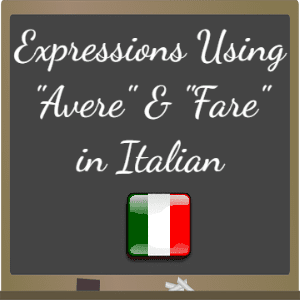In this lesson, we will learn some expressions using “avere” (to have) and “fare” (to do or to make) that are common in Italian.
Some expressions in Italian do not make sense if literally translated into English. For example, the expression “dare un esame,” meaning “to take an exam,” uses the verb “dare” (to give) rather than “prendere” (to take). The verbs “avere” (to have) and “fare” (to do or to make) are very common in Italian and are used in many expressions.
1. Expressions using “Avere” in Italian
In addition to the obvious use of “avere” to indicate possession, e.g., “Ho due gatti” (I have two cats), there are some less obvious uses of the verb “avere” in Italian.
Age
In English, we use the verb “to be” to describe age, as in “how old are you?” and “I am 30 years old.”
The verb “avere” is used in Italian instead; that is, we literally say, “I have 30 years old” rather than, “I am 30 years old.” Here are a few more examples:
| Quanti anni hai? | How old are you? |
| Ho 40 anni. | I am 40 years old. |
| Lui ha 20 anni. | He is 20 years old. |
Feelings & Desires
Some expressions in Italian describe a feeling or desire using the verb “avere,” while their equivalents in English use the verb “to be,” e.g., “Ho paura” (I am afraid). The word “paura” means “fear.” Thus, we literally say, “I have fear.”
Some other examples include:
| avere fame | to be hungry | avere sete | to be thirsty |
| avere freddo | to be cold | avere caldo | to be hot |
| avere sonno | to be sleepy | avere allergie | to be allergic |
Other Expressions
Finally, there are many other idioms and expressions that use the verb “avere.” One common expression is “Ha senso,” which means “It makes sense.”
Some other expressions include:
| avere ragione | to be right | avere torto | to be wrong |
| avere successo | to be successful | avere luogo | to take place |
| avere fretta | to be in a hurry | avere fortuna | to be lucky |
| avere inizio | to begin | avere la parola | to have the floor |
| avere a che fare con | to have to do with | avere da fare | to be busy |
| avere dolore | to have pain | avere bisogno di | to need |
2. Expressions using “Fare” in Italian
There are many expressions that use the verb “fare” (to do or to make) in Italian, when similar expressions in English would not. We have encountered the verb “fare” used with weather expressions in Level III, Lesson 7, e.g., “fa freddo” (It is cold). Similarly, the verb “fare” in “Il tè fa bene/male” simply replaces the verb “to be” to mean: “The tea is good/bad.”
Let us examine some other expressions that use the verb “fare.”
Sports & Hobbies
In general, we use the verb “fare” when referring to sports and hobbies.
Here are some examples:
| fare sport | to play sports | fare ginnastica | to exercise |
| fare una corsa | to go for a run | fare una passeggiata | to take a walk |
| fare surf | to do surfing | fare snowboard | to snowboard |
| fare ciclismo | to go cycling | fare yoga | to do yoga |
House Chores & Daily Tasks
The verb “fare” is also used with many house chores and day-to-day tasks. Examples include:
| fare i compiti | to do homework | fare il bucato | to do laundry |
| fare il letto | to make the bed | fare una telefonata | to make a call |
| fare la spesa | to buy groceries | fare il pieno | to fill up on gas |
| fare le faccende | to do the chores | fare spese | to go shopping |
| fare colazione | to have breakfast | fare le pulizie | to do the cleaning |
| fare la doccia | to take a shower | fare il bagno | to take a bath |
Other Expressions
There are many other idioms and expressions that use the verb “fare” that do not fall under any of the aforementioned categories, such as:
| fare la fila fare la coda | to wait in line | fare in tempo | to do something in time |
| fare presto | to be early | fare tardi | to be late |
| fare una domanda | to ask a question | fare una pausa | to take a break |
| fare male | to hurt or to be painful | fare una foto | to take a photo |
| fare da sé | to do on your own | fai da te | DIY |
| fare di tutto | to do everything possible | fare un pisolino | to take a nap |
Finally, the verb “fare” can be used in many causative expressions meaning “to have someone do something.” For example:
| fare vedere a qualcuno | to have someone see (to show someone) |
| fare cucinare a qualcuno | to have someone cook |
Next: Present Subjunctive Tense I
Other lessons in Level IV:











